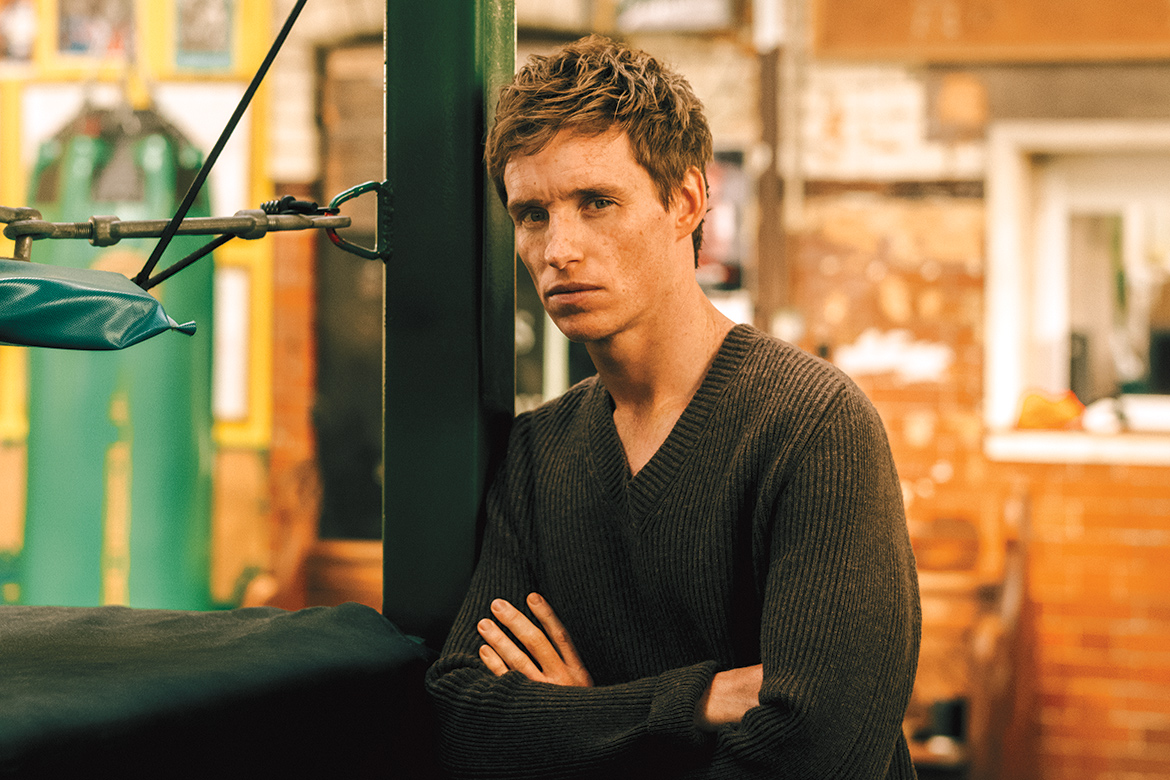In Frederick Forsyth’s classic thriller, The Day of the Jackal, the titular “Jackal” is a master of disguise. So when it came to casting Peacock’s TV adaptation, the first requirement was a lead actor who could transform .
“We all knew that Eddie Redmayne was a fantastically talented, ferociously intelligent actor who had chameleon-like qualities,” says director Brian Kirk (Boardwalk Empire, Game of Thrones). "But we were most taken with what he did in The Good Nurse; he was playing very aggressively in a contemporary space. And he was playing a character who was inherently unknowable and very dangerous — perfect for the Jackal.”
“With Eddie, it’s not just what you can do with prosthetics and how you can change looks, but also his physicality, his gait and all of those things,” says executive producer Nigel Marchant. “He has that ability for you to empathize with him, but then he can also play very, very cold. You believe he could be an assassin that can kill people. So, we were thrilled he came on board. It's an iconic role. We've got an iconic actor for it.”
In the last decade, Redmayne has played a transgender pioneer in The Danish Girl, a genius diagnosed with motor neuron disease in The Theory of Everything (for which he won the best actor Oscar), a gentle and eccentric wizard in the Fantastic Beasts film franchise and a psychotic serial killer in the Netflix film The Good Nurse. What he hadn’t dabbled in, at least since 2012’s Birdsong (a 2012 BBC limited series available on Netflix), was series television.
“All of it was slightly new to me,” Redmayne says, speaking from his home in the U.K., “because I hadn't done TV for a good decade.” But Redmayne, who was educated at Eton and Cambridge, is a fast study. “In that time, I'd watched friends work in television and seen shows like Succession and The White Lotus and become a massive fan of this ‘golden age.’ So I was always curious a bout how the system worked.”
 Photo by: Charlie Gray / TRUNKARCHIVE
Photo by: Charlie Gray / TRUNKARCHIVE
Back in 2023, three scripts entitled The Day of the Jackal, written by Ronan Bennett, arrived in his inbox. “I had massive trepidation because I admired the original movie, but when I started reading them, I loved the fact that they were modern," Redmayne says.
Producer Christopher Hall (Showtrial, Bloodlands) explains how the series differs from the movie: “We're making 10 episodes, so it's a much bigger, richer canvas. It's the Jackal’s backstory; it's his personal life. In the film, you didn’t know who the Jackal was, even to the last frame. He’s on a mission to carry out a single hit, to kill [French President Charles] de Gaulle, but the Jackal himself is always a mystery and a cipher. Obviously, we play into that, but we do answer some of those questions.”
Bennett — whose latest show, MobLand, is on Paramount+ — has a very particular view of the world, according to Hall. “When you talk about AI writing scripts, I don’t think AI could come up with Ronan Bennett. He’s an original and a one-off. Look at [crime drama] Top Boy. He has that piercing intelligence and a particular worldview that’s really interesting. If I were to encapsulate his worldview, it’s that everyone has both good and evil in them. The Jackal is ultimately a sociopathic killer, but there’s something that we warm to in him enormously.”
In this series, the Jackal echoes classic action heroes, and for Redmayne that was part of the appeal. “This is a genre that I love, you know? The Bournes, the Bonds and those ’70s thrillers like The Parallax View — but it was never necessarily a genre that I thought would come my way.”
He says his success in roles such as Stephen Hawking in The Theory of Everything had sidelined him from consideration as a gun-toting action hero. “Sometimes people go, ‘Oh, you’re the sort of actor that always transforms,’ and I really was never that actor. I just got cast as Stephen Hawking and had to play a real person, and suddenly it’s that cliché that after something successful you get sent more of the same thing. It was, ‘You’re the guy that plays real people.’”
Ironically, playing the Jackal required multiple transformations, personas and prosthetics — but it was undoubtedly a move away from introverts in tweed jackets. “I love that he’s a more physical character. He’s a peacock,” Redmayne says. "I love that every time you see him, he’s wearing something different, going somewhere different."
Playing the Jackal required Redmayne to portray several different roles: He speaks German as a janitor who roams silently through the 30-minute, wordless opening scene; he plays an urbane family man back in his Cadiz villa with his wife, Nuria (Úrsula Corberó, Money Heist, Snatch); he jousts and parries with Bianca Pullman, an MI5 operative played by Lashana Lynch (The Marvels, No Time to Die).
He also had another role on this production: executive producer. Being an exec on a TV show is often a trophy title, but Redmayne was a committed and passionate fan of the original story, and of English actor Edward Fox, who starred in the 1973 film. So if he was going to be an EP and the star, he wanted to do The Day of the Jackal justice.
“Control freakery,” is how Redmayne describes his character type, adding, “There’s a control freakery to the Jackal that perhaps bled into my producorial role.”
 Photo by: Charlie Gray / TRUNKARCHIVE
Photo by: Charlie Gray / TRUNKARCHIVE
In film, the director is usually the control freak, the person in charge. But The Day of the Jackal runs 10 episodes with four different directors using different cinematographers and multiple noncontiguous locations. (A second season has been greenlit.)
"That was all new to me, and I wanted to understand how one found the continuity, or who was overseeing the whole thing," Redmayne recalls. “The answer was: There were tons of eyeballs on it, but it became clear that for Lashana and I, we were the continuity — we were the tissue between it all.”
According to Corberó, being that connective tissue meant a lot of hard work for Redmayne during the shoot. “I was a little bit worried about him, because he was carrying all the pressure. He was shooting every day, spending hours putting on all these prosthetics. It was hard work. I remember, at like 9 p.m., he was texting me asking, ‘Should we rewrite the scene for tomorrow?’ So we were having a lot of conversations.”
Corberó says Redmayne is demanding of himself and of other people. “But the craziest thing is that at the same time — maybe it’s because he’s British — he knows how to do it in an elegant way. He’s charming. And he fights for you. I know that I’m in this show because of him, because he was the one who insisted, ‘We need Úrsula for this.’ I will always be grateful to Eddie for that.”
Corberó’s role in the drama is a new one, but a vital one. As the Jackal’s wife, Nuria, she adds a home life, a backstory and a modicum of compassion to a character who in the book and film is just a stern-eyed shadow. “Nuria is the Jackal’s weakness,” she says. “It’s good for the viewers to see him being a very bad man, like super professional and dangerous, but then just being afraid of his wife. I think that’s what humanizes the Jackal.”
Humanizing the Jackal was the intention from the outset, Redmayne says. “The archetype of the empathy-less assassin whose blood runs cold couldn’t work in this version.” Television demands character depth. This new telling of the Jackal’s story offers explanations for why he is how he is. “We have him as a family man with a military background. Is he also sociopathic? I believe there was a juncture in his life from which point he has held those two things at the same time,” Redmayne says.
Part of the puzzle that Bennett’s scripts unlock is the Jackal’s logic of empathy. How does he square his love for his young child with the brutal demands of his job?
“He had assumed he would be alone all his life, and that’s how he was always going to function,” Redmayne says. “And yet when he meets Nuria and is floored by her charisma, you know that it’s an Achilles heel. When we meet him, he’s made a huge amount of money, he’s married with a child and he wants this to end. He’s lied to his wife from the word go but thinks he can wrap it up if this thing ends, so they can start a new life. And that’s his weakness as an assassin. We’ve been leaning into their love for each other and his love for his kid. That’s really important, and I hope that, again, what slightly differentiates the piece is that you’ll believe all that and you’ll care.”
The Day of the Jackal is executive-produced by writer Ronan Bennett along with Gareth Neame, Nigel Marchant, Sam Hoyle, Sue Naegle, Brian Kirk and Eddie Redmayne. The series is a production of Carnival Films, part of Universal International Studios, a division of Universal Studio Group.
This article originally appeared in emmy Magazine, Issue #7, 2025, under the title: "Assassin's Lead."











